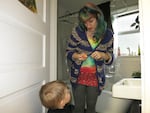Oregon has become something of an international center for surrogacy. In this five-part series, OPB's Kristian Foden-Vencil explores why this is the case, especially for gay Israeli couples.

Meet Mardi Palan, a hairdresser from Southeast Portland who lives with her partner and 2-year-old son. Palan is carrying twins as a surrogate for a gay couple from Israel.
Kristian Foden-Vencil / OPB
When we first met her in May 2015, Mardi Palan was signing a surrogacy contract that will pay her $30,000 for delivering twins for a gay couple from Israel.
She’s about 35 weeks pregnant now and spends her days cutting hair, looking after her 2-year-old son, Forest, and having weekly ultrasounds. This pregnancy is a bit different from hers with Forest.
“I’m a lot bigger than I was with Forest and just like other things like swollen ankles. You know,” Palan said.
Here’s how the surrogacy process works: First, a couple decides they want a baby and don’t want to go the adoption route. Most couples try for twins because each pregnancy costs about $120,000 — so twins is a kind of two-for-one deal. Second, the couple picks an egg donor. They’re shown pictures and given information like height, education and eye and hair color. The egg donors (lots of college students donate) are reimbursed between $5,000 and $10,000 for their donation.
Once the couple has picked the egg donor, they then pick a surrogate. Again they’re given all kinds of information: where she lives, what she does, her age. Generally, the surrogate has to be younger than 40 and has to have already had a baby to prove she can bear a child.
“I carried my son really well and I really enjoyed being pregnant. And people mentioned surrogacy as an option to make money on the side and do something really nice for someone else,” Palan said.
In Palan’s case, the two eggs she’s using come from another woman, and the sperm comes from the two fathers from Israel. Each man’s sperm was used to fertilize one egg, so they each get a child that’s genetically related. Palan says the twins aren’t hers, and the law, which doesn’t allow people to sell their children, agrees. Palan is being paid for services rendered not for her children.
“The analogy is that I am the soil. And someone else is the seed; someone else is the water, and so we come together to make the child,” Palan said.
But how does she feel about not using her own eggs?
“In the beginning I was like, 'I could totally use my eggs and be fine.' But the more I think about it, like, I feel I would be more curious. Like, what are they like? Do they like volleyball? Do they like tennis? You know, like, more invested in it,” Palan explained.
Palan says she’s having the twins for two reasons: one, to help a family that can’t have their own kids; two: to get a down payment for a home.
She also hopes to build a relationship with the twins and their fathers.
Related: One Oregon Woman's Journey Through Surrogate Motherhood Begins With A Contract
“I feel like I’ll be like an aunt or something. Where they’ll send random pictures of how they’re doing. And then Forest will know who they are too and Skype sometimes. ... You know they’re going to have their own life or whatever. So I don’t want to like intrude, you know, but I know they really want to keep in contact,” Palan said.
The intended parents for the children Palan is carrying didn’t want to talk to OPB. (Many Israeli families worry about upsetting the authorities who deal with their children’s citizenship applications.) But the twin's fathers are already here in Portland, waiting for the birth and getting to know Forest and Palan, whose due date is May 3.
After the babies' birth, the fathers must take care of passports, religious paperwork and birth certificates. If everything goes as planned, the babies will fly home to Israel about three weeks after they’re born. They’ll enter as U.S. tourists and then there’ll be a judicial hearing to secure Israeli citizenship.
Read More: Oregon, The Surrogacy State
Part I: Checkup: An Oregon Surrogate's Story
Part II: The 11th Commandment: Thou Shalt Have Children
Part III: Fertile Ground: Why Oregon Is The Surrogacy State
Part IV: Religion And State: Oregon Born, Israel Bound
Part V: DNA And Surrogacy: The Envelope, Please



